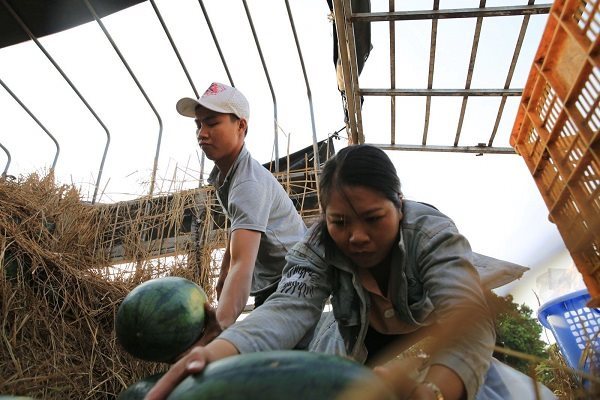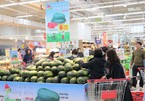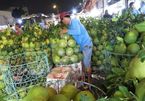According to Nguyen Thanh Thuy, deputy general director of Vincommerce, the owner of Vinmart chain, said the retail chain had contacted suppliers, but there was nothing to buy.

“They need to tell us what they have, time, amounts and prices,” Thuy said, adding that Vincommerce makes no profit to help farmers consume products.
Retail chains are willing to help rescue farm produce, but this is not easy to do.
Nguyen Thi Phuong, deputy general director of Central Retail, said its Big C supermarket chain joined the dragon fruit and water melon rescue program by selling products at cost and incurring a loss of VND15-17 billion worth in transportation cost.
| Some retailers have reportedto the Ministry of Industry and Trade (MOIT) that there is no more farm produce to rescue. But farmers still complain that their farm produce remains unsalable. |
However, suppliers said there is no more dragon fruit to provide to Big C. The retailer can collect water melon, but the price has increased by twofold.
This explains why consumers cannot buy farm produce at low prices at supermarkets, though they hear the information about farm produce rescue every day.
The activities of rescuing farm produce are still very busy in the market. In HCM City, some people have collected farm produce directly from farmers to sell for no profit.
L.V.P said he has sold 28 tons of water melon for farmers in Gia Lai province. One kilogram of water melon sold for VND4,300 per kilogram. The money from the sale was shown on his Facebook and transferred to farmers.
The representative of a large supermarket in HCM City said supermarkets mostly collect produce that needs to be rescued through cooperatives, farmers’ representatives and local agriculture departments. Most of the products cannot be exported.
In rescue campaigns, supermarkets and partners conduct negotiations about the collection of farm produce within a short time before they sign contracts. In some cases, during the rescue process, suppliers break the contracts when they hear that they can sell products to other partners at higher prices.
N.T.H.T, director of a company in Ben Tre province, said it is very difficult to bring products to supermarkets because supermarkets always set high requirements on quality and delivery. The requirements cannot be met by most farmers with their current farming process.
Therefore, if suppliers can sell products to other consumers or export to China, they would break the contracts signed with supermarkets.
Mai Lan

Farm produce stuck at border, but farmers don't want to sell
Thousands of trucks are still heading for the Vietnam-China border gates, though the exports are getting stuck because of the Covid-19 epidemic.

Farm produce prices slump as Covid-19 hits exports
The suspension of trade in seafood and agriculture products at some northern border gates with China as a measure against the novel coronavirus (Covid-19) has caused a demand-supply imbalance in the market.
 Some retailers have reportedto the Ministry of Industry and Trade (MOIT) that there is no more farm produce to rescue. But farmers still complain that their farm produce remains unsalable." itemprop="description" />
Some retailers have reportedto the Ministry of Industry and Trade (MOIT) that there is no more farm produce to rescue. But farmers still complain that their farm produce remains unsalable." itemprop="description" />